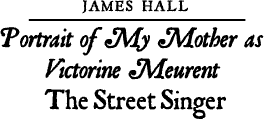
The man on top of my mother waits for her
to turn into a winged, calling thing.
Now that he’s captured her he’s thrilling
in her throat, flattening it with his hands.
The woman under him is guilty, mutable, he gets to judge
what she will become. The tongue, the tongue—
he knows she’ll use it when his grip loosens.
His grip rules her out of wren and raven
and pigeon and lark, blackening out the hours
of the avian July sky. The man knows how
to press a woman’s face into the hardwood floor,
to wear away her nose-skin, make the foul bones show.
He knows the body can become its own enemy.
The man and my mother have been lovers;
they’ve tried on each other’s skin,
dressing in the other’s clothes, going out renamed.
They stumbled home, those nights, tearing away
the clothes, the taped body scraped raw.
And that’s what it takes, memory of her skin,
to make him roll off of her. He can’t face the animal
he’s become. He walks, calm, into the kitchen.
Calm, reaching for the gun.
*
My mother runs even before she’s upright,
out the unlocked door, down the concrete stoop,
pulling up her pants, over the lawn,
into the Sunday traffic, waving her hands,
saying help in a voice she does not recognize.
In the street, man after man slows but does not stop.
Behind her, her lover opens the door, the shotgun still in hand.
Come back, Marsha Lynn, don’t you make this worse.
But a car of women stops, my mother is rescued.
Later, it looks like grace, his decision
to let her go; it helps her believe he’s sorry,
it will never happen again.
Days later, she’s climbing on top of him
in the cot, believing him when he says
she is beautiful, hoping this will heal her. The man moves
quietly underneath, handless, a meek thing—
except when he’s calling her name
in a voice indistinguishable from her own.
Each detail belongs to me, my easel—this is how the artist thinks.
Even the nicotine stains on her fingers,
even her delicate but practical underwear.
On every canvas, he punishes her form. In this frame,
my mother sells the undersweetness of lace against thigh,
a common street-singer. I want her, an obstacle in the afternoon
avenues, stopping traffic in her blueblack gown. It’s beginning
to rain, the passersby huddle closer.
But that doesn’t stop my mother, buried in the model’s
unmodest body, from singing. The artist doesn’t think,
Do I always shade her with damage? Of course the men
want to entangle themselves between her thighs, of course
they want to be the one high, clear note in the song,
to plait their pain with resonance. I never paint
their pudgy chins, their receding hairlines. A man sidles up,
he pays her on a sidestreet. Have I made him cruel enough,
will he heave her dress up to her stomach, will he touch her
thinking, Now I am her conqueror, now I am painting
the loudest part quiet in the rush of commerce,
I am disquieting her under the eaves? Thinking, My fingertips
will bruise her naked arms, her body will sing my hands for weeks.
Why must it always be raining, why is he cruel? Can’t the artist
paint them in love, meaning the timid heat between them, the man
is my father, they touch in the soundless place—
why not brushing a leaf off of her dress? Why does every woman
he paint look at me with my mother’s sunken eyes?
Eating too-ripe cherries, singing in the street.
The dress: will she burn it or bury it,
will she dye it red?
Sunday morning, the arena full.
From where my mother watches
in her trajes de luces, the thronged men
squirm, waiting for her entrance.
In her red suit, my mother is all sequined curtain-shine.
She says, I want to die. Looking as if she believes she could
disappear and the world would understand.
As if someone else would come to kill the bull,
as if anyone else could make it art.
You don’t have the guts to pull the trigger, I’ve seen your mouth
closed around the barrel, you’re a warrior, for Chrissakes,
pull it then, pull the goddamn—
I want to say, but all I manage is a mangled, Be careful.
Pointing to the pen where the dumb bull
snarls, overdecorated, pawing the earth,
He’s destined to gore you.
My mother does not blink. She is the mouth
where all blood leads, she is the thirsty god
and she wants to die and who will keep
the stained rapier, the emptied veins, the echoing in them.
I want to die, she says, holding her stomach.
Meaning, I have to die too. But now we’re facing
the crowd and the men are on their feet.
And now I’m the bull, charging toward her
at full gallop, trying to make her live again.
I bellow, bring my head low against her stomach
and wait for it to happen: the blood washing over me
like a cape, the sword meeting my brain stem: I’m free.
Everywhere, her name throbbing. My mother,
favorite model of Edouard Manet, the death of the charging bull.

